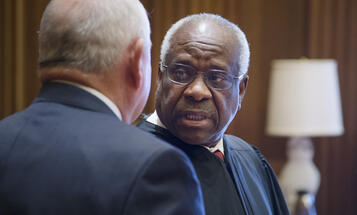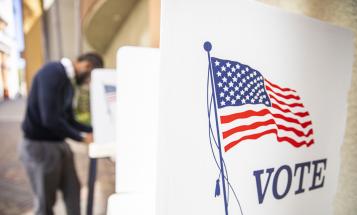
This Week's Citizens United "Parade of Horribles."
Two years after this disastrous decision it’s time to accept that it’s wrong, out-of-touch with modern political reality, and needs to be overturned.
In politics, when someone accuses another of “dragging out a parade of horribles” it’s usually to censure her opponent for doomsday exaggeration. But, as we approach the second anniversary of the case (January 21), I can’t think of a more accurate term for what Citizens United has wrought for American politics.
Let’s look just at the last week.
First, we had the continuation of a Republican primary that is by all accounts dominated by Super PACs. The New York Times reports yesterday how multi-million dollar gifts to Super PACs from just one or a few fabulously rich donors have fundamentally changed the rules of the contest. Now, candidates without a grassroots base or field operation can stay in the race nearly indefinitely because one rich person wants it that way.
Most notable is the $5 million check that casino mogul Sheldon Adelson recently wrote to help Newt Gingrich's otherwise doomed candidacy -- money that is now enabling the Gingrich campaign to blanket South Carolina's airwaves with anti-Romney ads. But maybe even more disturbing are the new revelations of how John Huntsman's father has pumped millions a dollars into a Super PAC aiding his son -- even as the Huntsman campaign insists that it doesn't coordinate its activities with the group, Our Destiny (which would be illegal). One more negative consequence of Citizens United, it may turn out, is to allow the super rich to buy their children political offices -- much as the aristocracy of the Old World used to confer title and power on their progeny.
Then, on the very same day as the New Hampshire primary, GOP lawyers filed a brief urging a federal appeals court to build on the logic of Citizens United to eliminate the century-old ban on corporations making contributions to candidates (Citizens United “merely” allowed corporations to spend on their behalf—not enough corporate power for some).
Corporations have no business playing in politics—through either “independent expenditures” or direct contributions—because translating economic success directly into political power is not a legitimate exercise in a democratic society. See my pre-Citizens United post elaborating on this point.
And, just last night, Stephen Colbert took his mockery of what’s left of our nation’s campaign finance laws to a new level—ceremoniously passing control of his Super PAC to Jon Stewart so he can run for “President of the United States of South Carolina”—with the full support of said Super PAC.
Like the father-son Huntsman example, Colbert’s humorous but sad exchange with Stewart and campaign finance lawyer Trevor Potter made painfully clear how weak the rules are that protect the concept of contribution limits by supposedly preventing “coordination” between Super PACs and candidates.
Two years after this disastrous decision it’s time to accept that it’s wrong, out-of-touch with modern political reality, and needs to be overturned. The Montana Supreme Court has given us the chance to revisit Citizens United. Let’s make the most of it.



